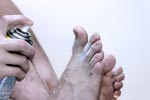Quality Antifungal Care
 Fungal infections are very common, especially in humid conditions. The most common fungal infections experienced by humans are ringworm and tinea. Both conditions bear a resemblance to other skin disorders such as eczema and psoriasis.
Fungal infections are very common, especially in humid conditions. The most common fungal infections experienced by humans are ringworm and tinea. Both conditions bear a resemblance to other skin disorders such as eczema and psoriasis.
Fungal infections are characterised by their location and often have commonly used names to describe them. Fungal infections can develop anywhere on the body but the most common locations are the scalp, nails, beard, feet (athletes foot) and groin (Jock itch).
Fungal infections vary in appearance
The appearance of fungal infections will vary depending on its location but in general small, inflamed lesions will appear on the skin. The skin may be dry and scaly or moist and crusty. Itchiness and discomfort is not uncommon.
Fungal infections are highly contagious and it is therefore important to obtain an accurate diagnosis and commence antifungal treatments as quickly as possible. As they can be mistaken for other skin conditions it is advisable to seek medical consultation before commencing treatment.
Contact with infected animals or articles should be avoided
The fungal infection can be passed from direct contact with an infected lesion or contaminated article such as towel, shower stall or shoes. Contact with an infected animal may also cause the development of a fungal infection (ringworm). Warm weather and tight clothing will encourage fungal growth.
Adopting the correct antifungal care is important to ensure the condition is correctly treated and ultimately cured. When treating fungal conditions an antifungal cream that can be bought over the counter is often sufficient to control and cure the fungal infection.
Improved antifungal care
However it is not an antifungal cream alone that will cure the condition. Improved personal hygiene and general antifungal care will also be required. The term antifungal care simply refers to general rules that will help to reduce the risk of developing fungal conditons.
- Wash hands thoroughly after handling pets.
- Ensure feet, especially the toe webbing, are well dried before wearing shoes.
- Keep under finger and toe nails clean and cut regularly.
- Don’t share towels, shoes or socks.
- Use an antifungal powder to treat mild cases on tinea.
- Avoid going bare foot in public places, especially communal showers.
Some forms of fungal infections will require more than an antifungal cream to be controlled. Fungal infections of the nails and scalp routinely require oral antifungal medications as they do not respond well to the antifungal creams.
